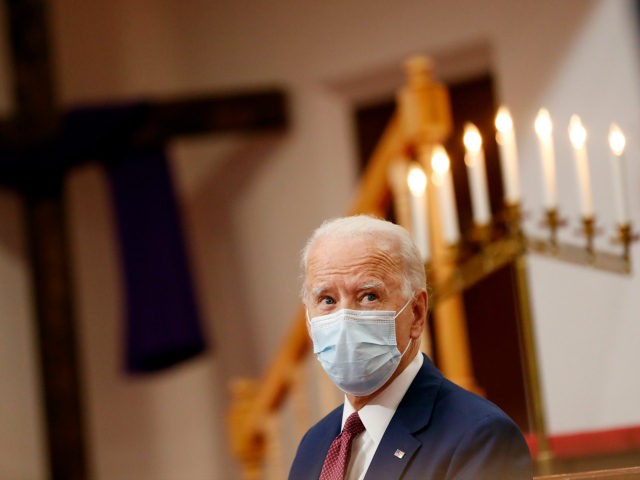The progressive bishop of San Diego, Robert W. McElroy, argued this week that President Joe Biden should be permitted to continue receiving Holy Communion despite his overt support for abortion rights.
“The Eucharist is being weaponized and deployed as a tool in political warfare,” Bishop McElroy states in a May 5 essay for America magazine, by those who insist that Catholic political leaders who actively promote abortion should not be allowed to receive Communion.
The Church’s Canon Law establishes that those who obstinately persevere in manifest grave sin “are not to be admitted to holy communion,” a stipulation that many Canon lawyers say applies to Catholics who publicly promote the expansion of abortion rights.
Bishop McElroy’s article was published four days after the archbishop of San Francisco, Salvatore Cordileone, released a teaching letter examining “the evil of abortion” and “the meaning of receiving Holy Communion.”
In that letter, Archbishop Cordileone wrote that Catholic politicians who advance pro-abortion legislation cooperate in the “grave moral evil” of killing an unborn child and should not receive Holy Communion.
The archbishop declared that there are circumstances where receiving Holy Communion is morally impermissible, since receiving the Eucharist “is to espouse publicly the faith and moral teachings of the Catholic Church, and to desire to live accordingly.”
“In the case of public figures who profess to be Catholic and promote abortion, we are not dealing with a sin committed in human weakness or a moral lapse: this is a matter of persistent, obdurate, and public rejection of Catholic teaching,” he wrote.
Moreover, Catholics in public life “who participate in abortion or seek to advance it through legislation or advocacy” cause scandal, he adds, “precisely because these are actions of which many people are aware.”
Bishop McElroy has echoed arguments proposed in 2004 by then-Cardinal Theodore McCarrick, when the U.S. bishops debated whether or not to give Communion to Catholic Secretary of State John Kerry, who also supported abortion rights.
At that time, McCarrick warned of “serious unintended consequences” in using Communion as a weapon, if priests or bishops were to refuse Communion to Kerry.
The battles for human life and dignity and for the weak and vulnerable “should be fought not at the Communion rail, but in the public square,” McCarrick said at the time.
McCarrick chose to ignore instructions from Cardinal Joseph Ratzinger, conveyed in a letter sent to him and then-Bishop Gregory in early June, 2004. In that letter, Ratzinger — then prefect of the Vatican’s doctrinal office (CDF) — said that in the case of a Catholic politician supporting permissive abortion laws, his bishop should inform him that he is not to present himself for Holy Communion until he brings to an end the objective situation of sin.
“When these precautionary measures have not had their effect or in which they were not possible, and the person in question, with obstinate persistence, still presents himself to receive the Holy Eucharist, the minister of Holy Communion must refuse to distribute it,” Ratzinger wrote (emphasis added).
McElroy, on the other hand, has argued that public support for abortion does not make a politician a bad Catholic.
“I feel compelled to address one very sad dimension of the election cycle we are witnessing — the public denial of candidates’ identity as Catholics because of a specific policy position they have taken,” Bishop McElroy said in an address prior to the 2020 presidential elections.
“Such denials are injurious because they reduce Catholic social teaching to a single issue,” the bishop continued, in clear reference to Joe Biden. “But they are offensive because they constitute an assault on the meaning of what it is to be Catholic.”
In his address, Bishop McElroy compared abortion to climate change and other issues.
“Each of these issues has a powerful moral claim upon the conscience of a faith-filled Catholic voter,” he added.
“There is no single issue which in Catholic teaching constitutes a magic bullet that determines a unitary option for faith-filled voting in 2020,” he stated and “voting for candidates ultimately involves choosing a candidate for public office, not a stance, nor a specific teaching of the Church.”
While “a specific act of abortion is intrinsically evil, the formulation of individual laws regarding abortion is not,” he contended.
Bishop McElroy has a history of downplaying the importance of abortion, insisting that it is no more important than other issues.
In February 2020, the bishop asserted that while abortion is a great evil, “the long-term death toll from unchecked climate change is larger and threatens the very future of humanity.”
Both abortion and climate change are “core life issues in the Catholic Church,” the bishop said during a public lecture at the University of San Diego, but neither should be identified as preeminent.
In November 2019, Bishop McElroy had resisted efforts by the U.S. bishops to declare abortion to be the “preeminent” moral issue for Catholic voters.
At the annual bishops’ meeting, McElroy said he disagreed with language singling out abortion as the “preeminent priority because it directly attacks life itself,” saying it was contrary to the teaching of Pope Francis.
Bishop McElroy said the text was “discordant with the Pope’s teaching, if not inconsistent” despite the pope’s frequent condemnations of abortion. Francis has called abortion a “scourge” and compared the act of abortion to hiring a hit man to take out a child.
While repeatedly defending Joe Biden, Bishop McElroy has never sought to conceal his hatred of Donald Trump, and soon after Trump’s inauguration called on Catholics to become “disrupters.”
In an address to a Meeting of Popular Movements in February 2017, McElroy said that “President Trump was the candidate of disruption. He was the disrupter.”
“Well, now we must all become disrupters,” he said.

COMMENTS
Please let us know if you're having issues with commenting.